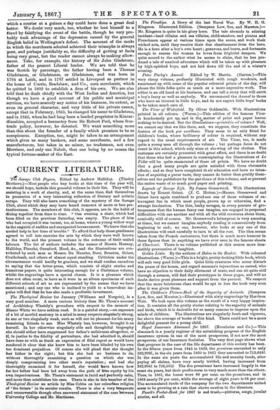The Theological Review for January (Williams and Norgate), is a
very good number. A more curious history than Mr. Thom's account of Archbishop Whately's procedure with respect to the memoir of Blanco White we have seldom read. It is a painful story,—an exposure of a bit of morbid anatomy in a mind in many respects singularly strong, in one or two singularly weak, such as will not be pleasant for his many remaining friends to see. Miss Whately has, however, brought it on herself. In her otherwise singularly able and thoughtful biography she should either have suppressed her father's unfairness altogether, or if, in justice to the fidelity of portraiture, she had admitted it, should have done so with as frank an expression of filial regret as would have rendered it clear that she knew him to have been blinded by his own too dominant prejudices. Of coarse she will plead that she thought her father in the right; but this she had no business to do, without thoroughly examining a question on which she was deeply compromising two other men's reputation ; and had she thoroughly examined it for herself, she would have known how tar her father had been led away from the path of true equity by his own imperiousness. Mr. Thom's statement is lucid and perfectly calm, and more than establishes his case. There is also in this number of the Theological Review an article by Miss Cobbe on her colourless religion of 'the future' in its secular results. There is also a very temperate and unanswerable though often answered statement of the case between University College and Mr. Martineau.




































 Previous page
Previous page